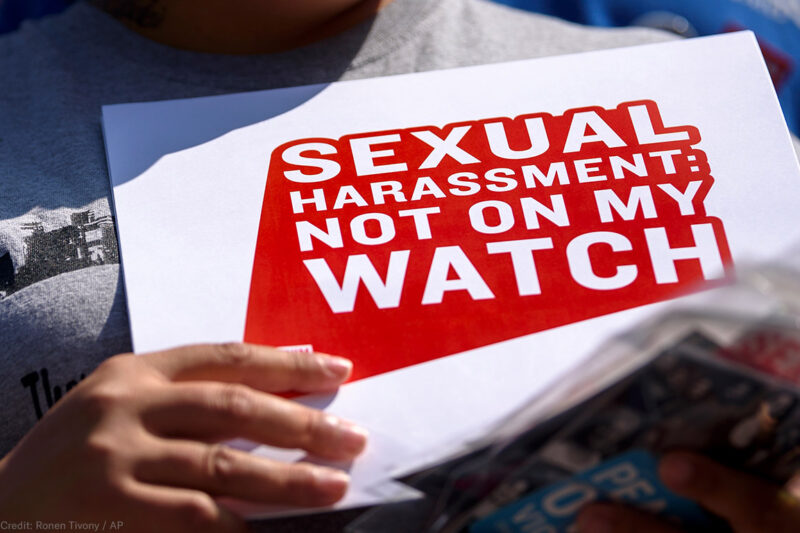Seven Years after #METOO, the BE HEARD Act Will Revolutionize Workplace Harassment Protections


This blog was updated 07/31/24 to reflect that the BE HEARD Act has been reintroduced in this Congress.
For nearly two decades, the activist Tarana Burke and survivors of sexual violence have used #MeToo to share their experiences, to allow women to be heard, and to respond to the needs of survivors. When the movement exploded in 2017, it sparked an unprecedented examination of sexual harassment and sexual assault, in our workplaces, and illuminated the multiple manifestations of workplace discrimination.
In the midst of this historic reckoning, the ACLU and its coalition partners drafted and shared with Congress members the Principles and Priorities for Legislative Action to Eliminate Workplace Harassment, a blueprint for addressing the scourge of discrimination in every workplace across the country. It is long past time for Congress to confront the reality that our current laws have not done enough to stamp out harassment and discrimination, especially for our most vulnerable workers—those in low-wage jobs (who are predominantly women of color), those facing language barriers, and undocumented workers.
In 2019, the voices of survivors and advocates reverberated in the halls of Congress with the introduction of a comprehensive and visionary piece of legislation: the Bringing an End to Harassment by Enhancing Accountability and Rejecting Discrimination in the Workplace Act, or the BE HEARD Act. This bill strengthens and expands the reach of our nation’s antidiscrimination laws, removes barriers that prevent individuals from accessing justice, and helps employers create harassment-free workplaces—while also holding them accountable when they fall short
Today, as Congress once again considers this vital legislation, we urge lawmakers to advance the BE HEARD Act. Learn more in our breakdown about what the Act will protect:
BE HEARD Extends Civil Rights Protections to All
Currently, the prohibition against employment discrimination under Title VII of the Civil Rights Act has only applied to businesses with 15 or more employees. Individuals who work alone, or in small workplaces, like domestic workers, have been virtually unprotected. But the BE HEARD Act would extend protections to all employees regardless of business size, as well as to those who don’t fall under the category of “employee,” such as independent contractors, volunteers, interns, fellows, and trainees. The bill also explicitly provides LGBTQ workers with protection from employment discrimination.
BE HEARD Gives Harassment Survivors a Fair Chance in Court
For nearly 40 years, federal courts have required survivors to prove harassment was “severe or pervasive” to prevail in court, a standard that is not found in the text of Title VII. Under this high standard, judges have refused to find conduct to be unlawful harassment even where the conduct may be criminal – like a supervisor squeezing an employee’s breast. Court decisions excusing such objectively abusive workplace conditions deprive survivors of relief, dissuade others from seeking justice, and embolden employers to ignore harassment complaints.
The BE HEARD Act also details the many factors that contribute to a hostile environment – such as power imbalances between the harasser and complainant, use of epithets or slurs, and the harassment’s frequency and duration, as well as whether it is physical or verbal – and offers a detailed roadmap to help judges and employers identify what conduct is unlawful.
BE HEARD Limits Secrecy and Promotes Transparency
Harassment and other forms of discrimination thrive in the shadows. This invisibility is often perpetuated by agreements workers are forced to sign before taking a job that require discrimination claims to be decided in secret arbitration proceedings rather than in court. The BE HEARD Act bans such agreements. It would also prohibit employers from demanding that workers sign blanket non-disclosure agreements, or NDAs, upon accepting a job, and limit the use of NDAs that keep workers silent if they settle their harassment claims.
BE HEARD Restores Protections for Workers Harassed by Supervisors
In a trio of decisions from 1998 and 2013, the Supreme Court made it more difficult to hold employers liable for harassment perpetrated by supervisors. In the 2013 case, the court held that an employee who sued claiming a supervisor harassed them had to meet a higher burden of proof if the supervisor could not fire, demote, promote, or transfer the employee—even if the supervisor did have the power to control the employee’s work life at work, such as what duties they performed or the number of hours they were assigned. The BE HEARD Act would remove these hurdles and make it easier for employees to hold employers liable for harassment committed by supervisors.
BE HEARD Ensures that Tipped Workers are not Excluded from Minimum-Wage Protections
The bill would ensure that workers in the service industry do not have to rely on tips to make minimum wage. Under federal labor laws, the current minimum wage for tipped workers is only $2.13. Studies have shown that tipped employees disproportionately experience harassment by customers and are too often forced to tolerate harassment because they are dependent on tips to make a decent wage. The BE HEARD Act would require tipped workers to be paid the same minimum wage as everyone else.
BE HEARD Requires Employers to Proactively Prevent Discrimination
The BE HEARD Act obligates employers to adopt comprehensive anti-discrimination policies and to provide training on these policies to all employees, including training specifically designed for supervisors. The requirements help to ensure that employees understand their rights—and that supervisors understand their obligations. These provisions are especially important in states and localities where employer efforts to prevent discrimination and promote equity are under attack. The bill also provides employers with best practices tailored to specific industries and model workplace climate surveys to expose unreported harassment.
Seven years after the #MeToo revolution, congressional action to address the national epidemic of on-the-job harassment is long overdue. BE HEARD is a vital, historic step toward assuring the dignity and safety of all workers; Congress must not delay any longer in taking it.



